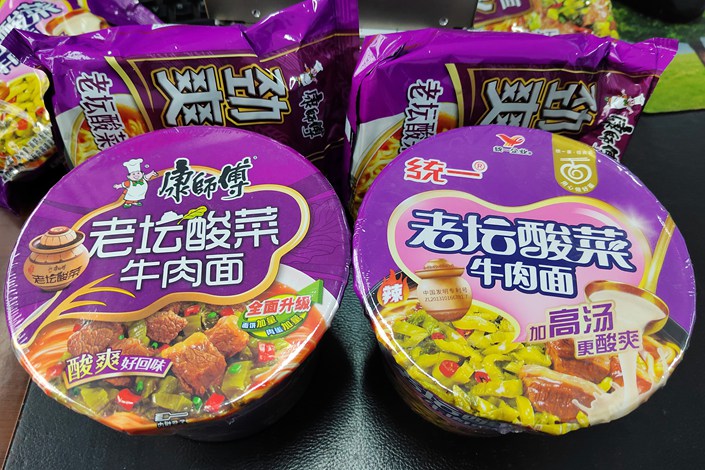
For four purveyors of pickled cabbage, the bad press from a Chinese state television expose earlier this month was just the beginning of their troubles with the public.
To be clear, only two brands, Master Kong and Uni-President, were found to have quality issues related to unhygienic food processing, for which they apologized and recalled some of their products.
Two of their competitors, fellow big shots in the instant noodle market — Jinmailang and Baixiang Food — also issued statements seeking to assure Chinese consumers that their products were perfectly safe.
Then something strange happened. A bit of rumor began finding its way into some of the news stories about the scandal. The rumor said that only one of the instant noodle giants was truly a Chinese brand — the other three were owned by the Japanese. Things then escalated. During one of Jinmailang’s livestreamed hawking sessions, its host got so much abuse online that she ended up in tears. The incident forced Jinmailang to put out several statements reiterating that it was entirely a Chinese company.
In the wake of all of this, someone dug up the fact that one of Jinmailang’s competitors had once rejected an acquisition offer from a Japanese buyer. That competitor was then showered with praise online.
This chaos — the unfounded accusations and the marketing farces — have damaged the competitive business landscape in China, and lowered the moral bottom line.
The case shows the risk that many brands face from nationalist sentiment.
Personally, I don’t hold any particular company at fault. However, the business world needs competition. We all know that well-ordered competition benefits consumption, helps industries progress and creates consumer surplus.
However, business ethics are to businesses what morals are to people. When marketers take advantage of patriotism to tar a competitor, meanness takes over. A self-righteous voice then drives public opinion, hurting enterprises. For a company to try to prove that it is a “pure” Chinese company is a trap, because one’s “bloodline” can never be proved beyond all doubt.
In Jinmailang’s scrambling effort to prove its “pure Chinese blood,” it seems that everyone is trapped, imprisoned by fluctuating nationalist sentiment in an unpredictable business environment. On occasion, companies have tasted the sweet reward of populism and nationalism by unwittingly pandering to the “bloodline theory” while some might even deliberately pursue it. This, however, will do great harm to China’s efforts in the reform and opening up. It will damage the country's reputation and undermine its business environment.
Today, along with the regulation of the internet platform, China’s “Anti-Monopoly Law” is finally playing its due role, and the same is true of the Anti-Unfair Competition Law.
It is because of China’s resolute implementation of the reform and opening-up strategy that the country can stand in the center of the world economic arena. This success is a product of the efforts of both domestic and international investors, as well as state-owned and private enterprises.
Populism-based marketing tricks are being exploited by a handful of unscrupulous marketing and public relations companies. We should ask: Why has this so-called “bloodline theory” of enterprises gotten so much attention online? Who is behind this? Who is repeatedly spreading rumors to stir up trouble and manipulate populist feelings to drive out good companies? How can we create a level playing field for businesses in this new world?
Thanks to increased productivity and socioeconomic development — the industrial revolution and modern scientific and technological advances of the West, we can now easily meet people’s basic needs.
Consumer goods, just like science, have no national boundaries. From toothpaste and toothbrushes to toilets and bathtubs, from computer mice and computers to the internet and satellites, we are living in a world of imported goods, while the world is also benefiting because of the contributions of the Chinese nation.
Both the “bloodline theory” and the argument that the private sector should bow out of the market are fallacies of the same nature. They are essentially the manifestations of being against the market economy, social progress and science, and to some extent, the great regression of social intelligence and a failure of ideological enlightenment.
“No matter how the international environment may change, we should unswervingly open wider to the outside world,” Premier Li Keqiang said during this year’s “Two Sessions.”
“The Yangtze and Yellow rivers will always flow forward, just as China has never stopped pursuing opening up over the past four decades,” he said.
Li also said that China is ready to do anything that is conducive to high-level opening up and that this is an opportunity that we must keep pursuing.
These words are encouraging. They are both a confession to history and a firm declaration to the future. Let’s hold them true.
Song Xiangqian is the founding partner and chairman of Harvest Capital and a member of the finance committee of the Securities Association of China and of the mergers & acquisitions and finance committee of the China Association for Public Companies.
Get our weekly free Must-Read newsletter.







